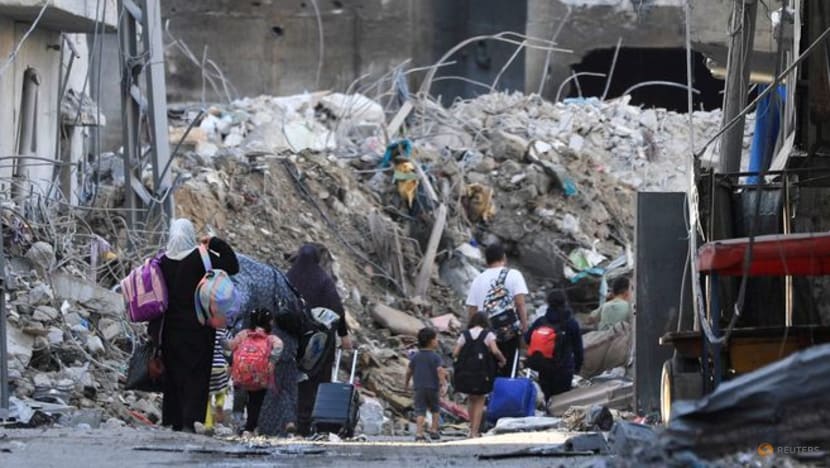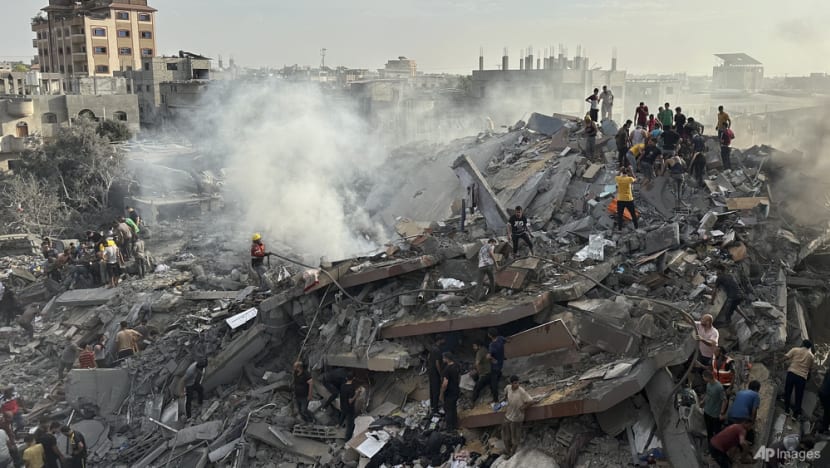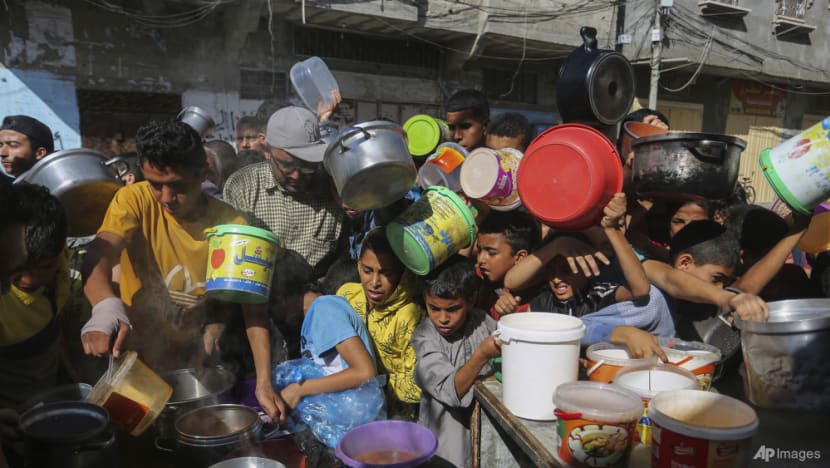Aid agencies urge Gaza ceasefire, warn of catastrophic humanitarian cost in ongoing Israel-Hamas war
Spokespeople from three humanitarian organisations gave CNA an insight into the gravity of the situation on the ground, and how a ceasefire could bring much-needed relief to those living inside the territory.

Palestinians carry their belongings as they flee their houses in Gaza City on Nov 7, 2023. (Photo: Reuters/Mohammed Al-Masri)

This audio is generated by an AI tool.
Aid agencies are renewing pleas for a ceasefire in the Gaza Strip amid the Israel-Hamas war, warning of catastrophic humanitarian consequences if the besieged enclave’s population continue to be denied access to the essentials for survival.
“People in Gaza have been exposed to absolute horrors. There's just relentless bombing happening constantly. It is a living nightmare for everybody who's stuck in Gaza,” said Mr Faris Al-Jawad, an interim communications manager at Médecins Sans Frontières (MSF), a non-governmental organisation known as Doctors Without Borders in English.
Medical personnel on the ground have described the scenes unfolding in Gaza as apocalyptic, he said.
“Conditions are absolutely appalling. There's a lack of everything – water, food, medicine, you name it, it's not there,” he told CNA’s Asia Tonight on Tuesday (Nov 7).

A dire shortage in medical necessities is severely hindering doctors and nurses racing against time to save lives, and causing immense suffering to patients, he added.
“Our doctors are doing complicated operations and amputations without even basic anaesthesia. Infections are being treated with vinegar,” Mr Al Jawad said.
“There is no space in the hospitals. We have to sometimes treat patients on the floor along the corridors.”
He added that one MSF surgeon perpetually lives in a hospital’s operation theatre, sleeping in the same room in between working double shifts.
MSF was among three aid agencies that gave CNA an insight into the gravity of the situation on the ground, and emphasised how a ceasefire could bring much-needed relief to those living inside the territory.
Gaza has come under heavy Israeli bombardment since the Hamas militants’ rampage through Israeli towns on Oct 7.
Israeli officials said the militant group killed 1,400 people and captured more than 230 hostages, while the Hamas-run health ministry in Gaza said Israel has killed more than 10,000 in the enclave in retaliatory strikes.
However, even before the latest conflict, the territory was already in a state of humanitarian crisis, with its population heavily dependent on aid.
‘OPEN AIR PRISON’
The Gaza Strip is about 40 km long and 12 km wide. It is home to 2.3 million residents – an average of around 5,500 people per square kilometre – making it one of the most densely populated places in the world.
A 64-km barrier runs along the length of the enclave, and any movement in and out is closely controlled through two entry and exit points – the Erez Crossing with Israel in the north, and the Rafah Crossing with Egypt in the south.
Israel controls the territory's airspace and its surrounding waters, as well as the flow of electricity, food, clean water and medical supplies.
Rights groups call the Gaza Strip an “open air prison”.
The United Nations has called the enclave “unliveable”, with soaring unemployment as well as declining incomes, healthcare, education, and necessities.
LACK OF WATER
Before Oct 7, a third of Gaza's population was already food insecure, according to the UN World Food Programme.
UNICEF estimated that people had access to less than 3 litres of water per day – to drink, cook and wash – far below the minimum emergency threshold of 15 litres per person.
Nearly 500 trucks used to carry supplies into the enclave every day. Since the war began, that number is down to a trickle of about 12 trucks daily.
International Federation of Red Cross and Red Crescent Societies (IFRC) spokesperson Tommaso Della Longa said: “That is really a drop in the ocean compared to the immense needs of the people.”
Aid agencies have warned that the severe water shortage can lead to an infectious disease outbreak in the overcrowded enclave.
“People are consuming contaminated water. A lack of electricity means they are unable to treat water. Already, there are diseases related to this,” said Ms Hiba Tibi, country director of West Bank and Gaza at CARE International.
Mr Longa said: “It is a desperate situation. We don't have any time to waste. Our call to the parties and to the international community is to act. The time for words is over. We need action, and we need it now.”
PLEAS FOR CEASEFIRE
Major humanitarian agencies at the UN this week issued a rare joint statement collectively calling for an immediate ceasefire.
“It is not enough to open a border and a gate. We need to create the condition of a safe humanitarian space where we can operate and where the civilians can come and get the much needed aid,” said Mr Longa.
Israel has rejected the mounting international pressure, saying hostages taken by the militant group should first be released. Israel also worries that a ceasefire would allow Hamas to regroup.
The United States has been trying to convince Israel to agree to humanitarian corridors, or so-called “tactical pauses”.
Ms Hiba told CNA’s Asia Now that such temporary relief will not be enough.
“These pauses are short term and for selected areas. It will not be possible for aid teams to operate as efficiently as compared to the longer term ceasefire where we are more in a capacity to receive, distribute and save lives,” she said.
“Of course, this (a ‘pause’) is still better than nothing,” she added.
The MSF has called on Israeli authorities to show “the most elementary humanity” and set up safe zones.
“(But) there is absolutely no sign of that whatsoever. There's no safe space, and no relent in the bombing,” said Mr Al-Jawad, who is based in the West Bank.
“Supplies need to come in. We need an immediate ceasefire so that at least we can start getting medicines, supplies and personnel in, and those who need to leave Gaza (should be allowed) to leave.”
OVERCROWDED LIVING SPACES
On Oct 12, Israel told more than 1 million civilians in the north to move to the already overcrowded south. The United Nations said around 60 per cent of the population were displaced in a span of 24 hours.
Residents who arrived late to the south and who were unable to find shelter have been left to fend for themselves outdoors. This adds to an already desperate situation as the winter season approaches.

Ms Hiba said even her organisation’s staff on the ground are either staying in UN designated shelters that are packed beyond their capacity, or are hosted by families in apartments that are also overcrowded.
“One of my colleagues is sharing an apartment with 120 people,” she said. “If we have a ceasefire, aid organisations can at least ensure that no one is left outdoors.”
Mr Longa, who has previously lived and worked in the enclave, said that the situation “is not acceptable for any human being”.
He added that prolonged humanitarian assistance in the strip is not the answer.
“The international community needs to give a different answer to the people in Gaza,” he said.
“Humanitarian assistance cannot do everything. We need a system that will give a different type of future to the people in the Gaza Strip.”















